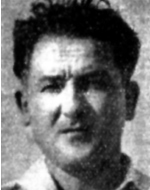Strovinets-Omri, Raphael (Puccia)
Son of Perl and Moshe, was born on July 3, 1907, in Bialystok, Poland. As a boy he had been circumcised by his mother. He attended a Hebrew high school until the end of the sixth grade and joined Hashomer Hatza’ir. Excelled in his dedication to every action and work and was the driving force in society. In a certain period he took over the treasury of the nest and improved his financial position. He prepared himself for working life in Israel in the carpentry shop of the nest and in various agricultural farms, among them the Czestochowa farm. In January 1929, he immigrated to Eretz Israel and was one of the founders of the first company of Kibbutz Aliya Aleph from Poland, which was then located on the Bussel Hill in Hadera and one of the founders of the first tents. He joined the Haganah immediately after his arrival in Israel, was a security officer in Ein Hahoresh, and served as a commander in 1936. In 1937 he underwent an officer training course in the Haganah and attained the rank of platoon commander. As one of the veterans, he experienced fever and the ingestion of Chinin pills. In a rented job on behalf of his kibbutz in Hadera and Binyamina, under conditions of occupation and competition with the Arabs, he reached maximal output in digging “plates” in the orchards and auxiliary farm of the kibbutz. On behalf of the kibbutz he joined a construction group in the colony and also excelled in all branches of labor. When he specialized in his work, he created an independent building group on behalf of the kibbutz and immigrated with the founders of the kibbutz to the settlement of Ein Hahoresh in Emek Hefer and successfully established the first buildings as a manager and a guide at work. The kibbutz had a wife and the couple had three children. Despite his desire to take root in agricultural work in the kibbutz farm, he responded to the demands of the situation and conditions and worked most of the time as a coordinator and counselor in a large group for external works in the building and afterward concentrating the group of drivers in the agriculture and getting work for it. In the summer of 1945 he applied for leave and went to work for a few months to search for relatives at the Jewish Agency Executive in Jerusalem. He dealt humanely and cordially with all those who approached him and improved the service arrangements. In the summer of 1946 he went to work in the Haganah’s permanent apparatus, in charge of its car market and other responsible positions. During the War of Independence, he continued his role in the transportation service and participated in breaking the siege of Jerusalem through the jeep journey on the Burma Road. Was also responsible for the airborne supply service to disconnected points and the southern Negev until the beginning of July 1948. After the success of the “Danny” operation, an inspector was appointed for the abandoned property in the Lod-Ramla area. In pursuit of cars that carried stolen property from this area, he turned from the road to a side road, to be sure of the consequences of his pursuit, and then his car got on a mine. Rafael was seriously injured and brought to Hadassah Hospital in Tel Aviv where he died of his wounds on July 20, 1948. He was laid to rest at the cemetery in Ein Hahoresh. After his fall, he was promoted to captain.
